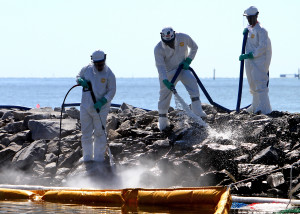Keep The Lines (of Pollution, Extortion, and Exploitation) Open

In the last print issue of the Washington University Political Review, my esteemed colleague Lennox Mark wrote an article advocating for the continuation of offshore oil drilling in the United States despite the BP Deepwater Horizon Oil Spill. His piece is compelling, making several great points. He discusses the importance of maintaining jobs in the oil industry and emphasizes the need for American energy independence. However, his article obfuscates several glaringly negative aspects of the oil industry and ignores the true cost of oil production and consumption.
Mr. Mark’s article implies that continuing offshore oil drilling will contribute significantly to American energy independence. However, offshore oil production has been declining since 2003, and in 2008, total U.S. offshore production was 280,000 barrels per day. When compared to the 1,189,000 barrels per day imported from Venezuela alone, U.S. offshore oil production is meager at best. Venezuela is a telling example of the diplomatic entanglements the United States finds itself in due to its enormous thirst for oil. Venezuelan president, Hugo Chavez is well-known for his oppressive tendencies and anti-American tirades. He has referred to his country’s oil reserves as “a card that we are going to play with toughness against the toughest country in the world, the United States”. Venezuela is just one among many of the United States’ dangerous partners in the oil game.
We send hundreds of billions of dollars a year abroad in oil revenues to such bastions of freedom and human rights as Nigeria, Saudi Arabia, Angola, and Libya. This does not include both the financial drain and the moral implications of military assistance and weapons sales to these countries to ensure that the black gold keeps flowing.
I think Mr. Mark would agree with me on the severity of this problem. However, he fails to acknowledge in his article that the United States will not be able to call itself energy independent if it continues to consume massive amounts of oil. The United States would have to increase its offshore oil production by a factor of 30 in order to only halve the amount of oil we currently import. Is such a meager trickle of oil from offshore production worth the potential for catastrophe for American citizens living along our coastlines, as we witnessed with the BP spill?
Another common misconception about the BP oil spill is that it was a freak accident in an industry that has been operating successfully for decades. This is not even true in the United States, lest we forget the Exxon-Valdez spill in 1989, and even less true for the people of Nigeria. Oil spills are a routine part of life for Nigerians, with more than 7,000 spills since 1970. Much more oil is spilled and goes largely ignored from the Niger Delta’s network of pipes and oil platforms annually than the entirety lost in the Deepwater Horizon spill. These spills poison drinking water, destroy populations of fish that local people depend on, and devastate the environment. Where does this costly (in terms of human lives and livelihoods) oil from Nigeria go? Into the gas tanks of our cars, trucks, and planes. The United States imports 1,143,000 barrels of oil per day from Nigeria, once again dwarfing what we produce offshore.

If the United States is to maintain our offshore drilling, we do so with the knowledge that we endanger oil rig workers across the world every day. We do so with the knowledge that we endanger our global environment every day. And we do so with the knowledge of how continued use of oil puts our country at risk every day.
I won’t suggest that the world should place a worldwide moratorium on offshore drilling for oil right now. Such a suggestion would be unreasonable and unrealistic. But I will say that the BP Deepwater Horizon Oil Spill must serve as a wake up call and incite a fundamental shift in the way we think about energy in the United States.
We must not forget the fact that oil use in the United States means oil importation to the United States. We cannot afford, in terms of lives and livelihoods lost, monetary expenditures, and geopolitical vulnerability, to continue to import massive amounts of oil. Perhaps Mr. Mark is right: the fundamental problem is not drilling for offshore oil. It is oil itself.